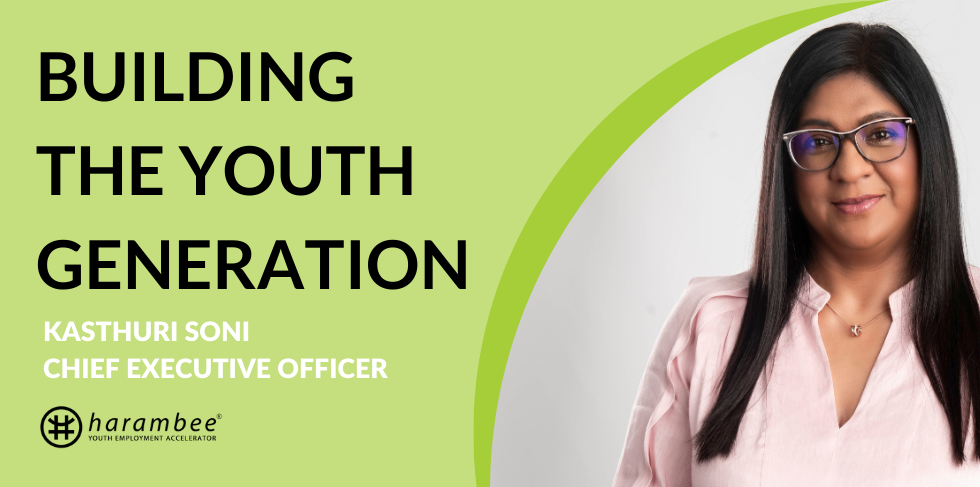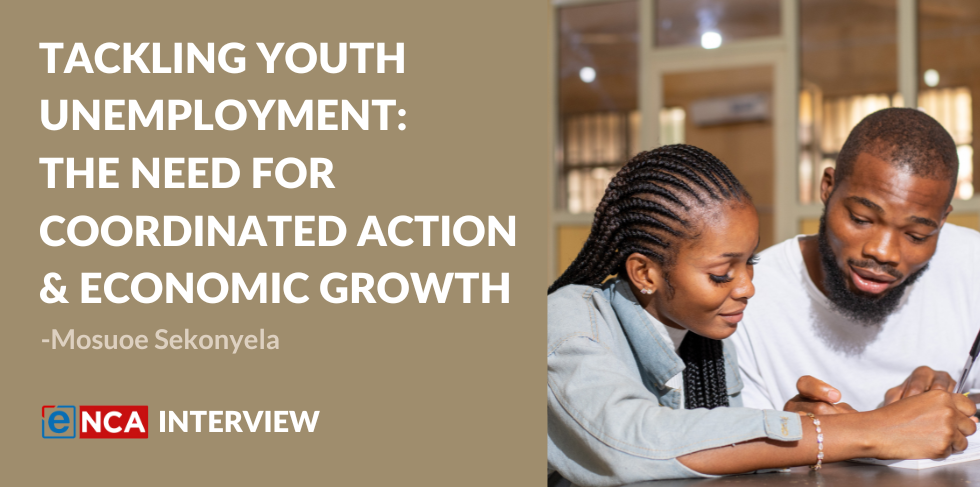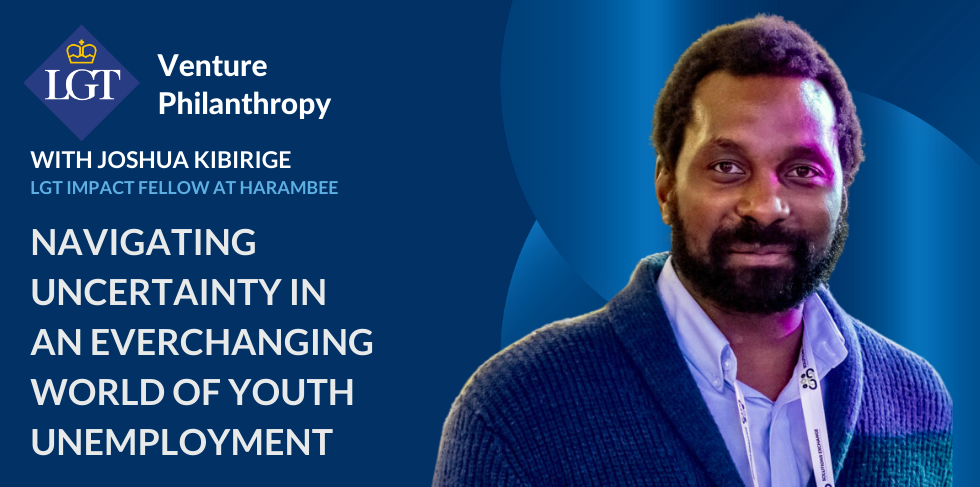South Africa is being plagued by massive youth unemployment, which is not just affecting the economy today, but is guaranteed to have a long-term impact on our society and economy. It’s widely acknowledged that large scale public-private partnerships are vital in creating job opportunities and providing training and skilling programmes, but not enough people are putting in the effort needed to address the heart of the crisis.
Economic growth is essential to create new jobs and livelihoods to address youth unemployment on a sustainable basis. The private sector has a critical role to play, both in terms of creating formal economy jobs for youth, as well as for creating self-enterprise opportunities, often simply by making their procurement supply chains more accessible to young entrepreneurs. This is important to enable more young people to participate in many of the enterprise development initiatives in the country,” said Kasthuri Soni, CEO of Harambee Youth Employment Accelerator (Harambee).
Harambee is a not-for-profit, social enterprise that partners with business, government, civil society and young people to tackle youth unemployment by unlocking earning opportunities for youth, and breaking barriers to economic access and inclusion. Harambee takes a highly data-driven approach to their work by gathering insights and intelligence from the young people they work with, in order to better understand the solutions required to get youth meaningfully participating in the economy.
“There are nine million youth in the country who are not in employment, education, or training (NEET), and every year another million young people enter the labour market, approximately 60% of whom are likely to also end up as NEETs. The scale, depth and complexity of the youth unemployment crisis is too significant to be addressed by any single solution or any single actor in the ecosystem. The need for large scale public-private partnerships has never been greater and more urgent.
At Harambee, we have a mantra that guides our work – we stay in love with the problem, and not our solutions, which means that we iterate our solutions based on what the problem demands of us. Through our public-private partnership with the Presidency, led by the Department of Employment and Labour, together with a network of government, private sector and civil society partners, we have collectively built the SA Youth Network which is a game changer for the youth of our country,” she added.
Harambee operates the multi-channel, tech-enabled SA Youth Platform (sayouth. mobi), which gives a network of 3,8 million excluded youth free access to aggregated earning and learning opportunities from over 1,300 private and public sector employer partners. The Platform’s geo-mapping capability addresses the transport cost barrier by matching young people to opportunities in close proximity to where they live. Prior to this, young people had to use their limited resources to navigate various broken systems and move from one organisation to another to access opportunities. This was the impetus for launching the Presidential Youth Employment Intervention (PYEI) in 2020.
“The PYEI is a national, coordinated multisector strategy and programme to address youth unemployment in South Africa. The intention is to align efforts and connect existing organisations in the ecosystem that serve unemployed youth in order to aggregate opportunities and optimise impact for the young people”, said Soni. “Another labour market insight is that the private sector often adopts what we refer to as exclusionary recruitment practices, such as asking a first-time work-seeker for prior formal sector job experience or school marks. It’s a screening tool, but one that is highly exclusionary, so we spend a lot of time working with the private sector to encourage them to adopt more inclusive signals to get a sense of a young person’s employability, in a way that’s valuable to the employer but not exclusionary to the prospective employee,” added Soni.
Soni refers to a learning potential assessment that Harambee has developed which provides a more accurate picture of a young person’s problem-solving ability. Pilot testing has shown that this measure alone opens up a pool of around 20% more young people who could be a good fit for the job, but are overlooked by traditional matching, which typically uses school marks as a screener.
The organisation also encourages employers to look beyond corporate work experience by considering the other work experience the youth might have built up, such as volunteering at a church, and what that experience suggests about the individual’s self-agency, skills and actual potential. “Furthermore, we’ve learned that young people’s pathways in the economy are not linear. They zig zag through the labour market, with the nature of work now being transient, and gig work becoming so prevalent, resulting in limited permanent jobs,” said Soni, adding that young people fall in and out of economic activity frequently, as a result.
An additional major problem is that a high proportion of skilling initiatives are not producing young people that are work-ready, resulting in many young people with certificates and qualifications that haven’t correctly prepared them for the world of work—both in the knowledge they have gained and the ‘softer’ skills like clear communication or problem-solving, required by employers—resulting in a demand-supply mismatch. When you combine that with an economy that is struggling with low growth and hiring, it adds further to the challenges around youth employment.
Despite these barriers, in terms of opportunity creation, Harambee’s studies have shown that there are sectors that do have growth potential. In these priority sectors, Harambee designs and tests scalable solutions to stimulate new jobs, together with its ecosystem partners. Not surprisingly, the digital economy is a sector that shows much promise to absorb young people into the economy. According to Harambee’s research findings, there are potentially 66,000 digital jobs available in the country, over 40,000 of which are entry-level roles, suitable for young people. However, there is a significant shortage of suitably skilled individuals to fill these positions. As a result, Harambee works with business, government and civil society in the digital economy, by playing an intermediary role, bringing these parties together to solve the talent gap through an ecosystem approach, instead of as individual companies.
“Together with other partners we have co-incubated another NPC called Collective X, which is an intermediary that focuses squarely on massifying digital skills for market-relevant digital roles to connect demand and supply. This also creates an evidence base and demonstration effect to reshore digital work back into South Africa” added Soni.
Harambee has also piloted alternative skilling solutions that are more agile and responsive to the market. They operate a work-integrated learning initiative called DigiLink to place young people into a 12-month programme where they learn skills like data analysis and software testing, and practice these working on live client projects.
“These young people work under close supervision and coaching over a 12-month period, which provides them with both technical practical knowledge, work experience and behaviour socialisation for the working world. Upon completion of the programme, these young people are transitioned into more sustainable job opportunities with our employer partners, at salaries that are transformative for their households,” said Soni.
The organisation also assists young people by conducting mock interviews. The aim of these is twofold: firstly, they provide the young learners with the opportunity to participate in practice interviews, helping them to build their confidence and interview skills. Secondly, the engagement exposes senior representatives from potential employers to the incredible network of young people on the SA youth Platform and the benefits of inclusive hiring. In a similar vein, Harambee launched the Youth Voices Programme through which young people who have participated in a range of Harambee interventions are encouraged to share their stories. This enables them, to be change agents and role models to other young people, inspiring them to stay engaged and actively seek work.
“Youth Month gives us an opportunity to shine a light on youth economic inclusion and highlight ways in which we can work together as a society, to get young people productively engaged in the economy. Most importantly, we want business from across the country to recruit through the SA Youth Partner Network (partners.sayouth.org.za), which uses its inclusive matching engine to help employers discover talent and potential beyond what traditional CV matching can achieve,” said Soni
Click here to download the pdf.
Source: BBQ Online: https://bbqonline.co.za/magazine/BBQ100/ [Page 40-41]
Contact Us
customer@harambee.co.za
0800 72 72 72
Mon-Fri 9am-4:30pm





 Stay Connected
Stay Connected



